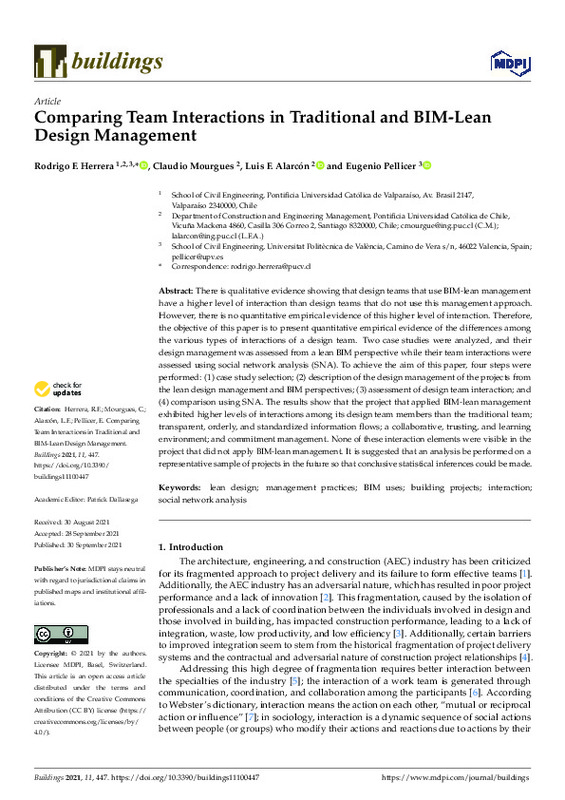JavaScript is disabled for your browser. Some features of this site may not work without it.
Buscar en RiuNet
Listar
Mi cuenta
Estadísticas
Ayuda RiuNet
Admin. UPV
Comparing Team Interactions in Traditional and BIM-Lean Design Management
Mostrar el registro sencillo del ítem
Ficheros en el ítem
| dc.contributor.author | Herrera, Rodrigo F.
|
es_ES |
| dc.contributor.author | Mourgues, Claudio
|
es_ES |
| dc.contributor.author | Alarcón, Luis F.
|
es_ES |
| dc.contributor.author | Pellicer, Eugenio
|
es_ES |
| dc.date.accessioned | 2021-11-05T14:08:12Z | |
| dc.date.available | 2021-11-05T14:08:12Z | |
| dc.date.issued | 2021-09 | es_ES |
| dc.identifier.issn | 2075-5309 | es_ES |
| dc.identifier.uri | http://hdl.handle.net/10251/176320 | |
| dc.description.abstract | [EN] There is qualitative evidence showing that design teams that use BIM-lean management have a higher level of interaction than design teams that do not use this management approach. However, there is no quantitative empirical evidence of this higher level of interaction. Therefore, the objective of this paper is to present quantitative empirical evidence of the differences among the various types of interactions of a design team. Two case studies were analyzed, and their design management was assessed from a lean BIM perspective while their team interactions were assessed using social network analysis (SNA). To achieve the aim of this paper, four steps were performed: (1) case study selection; (2) description of the design management of the projects from the lean design management and BIM perspectives; (3) assessment of design team interaction; and (4) comparison using SNA. The results show that the project that applied BIM-lean management exhibited higher levels of interactions among its design team members than the traditional team; transparent, orderly, and standardized information flows; a collaborative, trusting, and learning environment; and commitment management. None of these interaction elements were visible in the project that did not apply BIM-lean management. It is suggested that an analysis be performed on a representative sample of projects in the future so that conclusive statistical inferences could be made. | es_ES |
| dc.description.sponsorship | This research was funded by Fondecyt Regular, grant number 1210769 and ANID, grant number CONICYT-PCHA/National Doctorate/2018-21180884. The APC was paid by the Pontificia Universidad Católica de Valparaíso. | es_ES |
| dc.language | Inglés | es_ES |
| dc.publisher | MDPI AG | es_ES |
| dc.relation.ispartof | Buildings | es_ES |
| dc.rights | Reconocimiento (by) | es_ES |
| dc.subject | Lean design | es_ES |
| dc.subject | Management practices | es_ES |
| dc.subject | BIM uses | es_ES |
| dc.subject | Building projects | es_ES |
| dc.subject | Interaction | es_ES |
| dc.subject | Social network analysis | es_ES |
| dc.subject.classification | PROYECTOS DE INGENIERIA | es_ES |
| dc.title | Comparing Team Interactions in Traditional and BIM-Lean Design Management | es_ES |
| dc.type | Artículo | es_ES |
| dc.identifier.doi | 10.3390/buildings11100447 | es_ES |
| dc.relation.projectID | info:eu-repo/grantAgreement/FONDECYT//1210769/ | es_ES |
| dc.relation.projectID | info:eu-repo/grantAgreement/CONICYT//PCHA%2FNational Doctorate%2F2018-21180884/ | es_ES |
| dc.rights.accessRights | Abierto | es_ES |
| dc.contributor.affiliation | Universitat Politècnica de València. Departamento de Ingeniería de la Construcción y de Proyectos de Ingeniería Civil - Departament d'Enginyeria de la Construcció i de Projectes d'Enginyeria Civil | es_ES |
| dc.description.bibliographicCitation | Herrera, RF.; Mourgues, C.; Alarcón, LF.; Pellicer, E. (2021). Comparing Team Interactions in Traditional and BIM-Lean Design Management. Buildings. 11(10):1-25. https://doi.org/10.3390/buildings11100447 | es_ES |
| dc.description.accrualMethod | S | es_ES |
| dc.relation.publisherversion | https://doi.org/10.3390/buildings11100447 | es_ES |
| dc.description.upvformatpinicio | 1 | es_ES |
| dc.description.upvformatpfin | 25 | es_ES |
| dc.type.version | info:eu-repo/semantics/publishedVersion | es_ES |
| dc.description.volume | 11 | es_ES |
| dc.description.issue | 10 | es_ES |
| dc.relation.pasarela | S\446752 | es_ES |
| dc.contributor.funder | Pontificia Universidad Católica de Valparaíso | es_ES |
| dc.contributor.funder | Fondo Nacional de Desarrollo Científico y Tecnológico, Chile | es_ES |
| dc.contributor.funder | Comisión Nacional de Investigación Científica y Tecnológica, Chile | es_ES |
| dc.subject.ods | 11.- Conseguir que las ciudades y los asentamientos humanos sean inclusivos, seguros, resilientes y sostenibles | es_ES |








